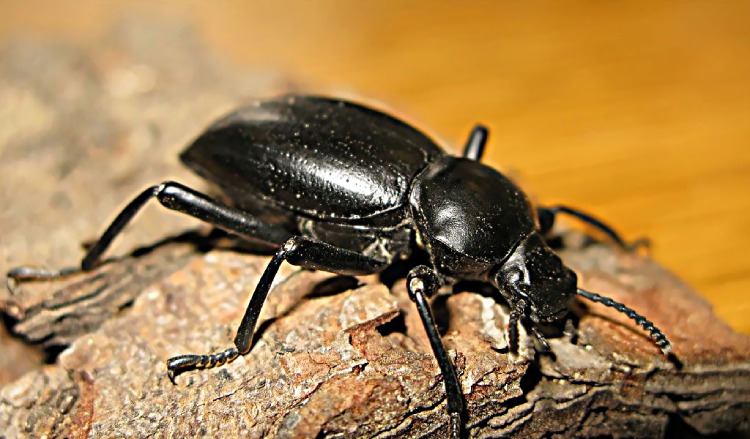Mealworm beetle
The mealworm beetle (Tenebrio molitor) is a species of darkling beetle that is native to many areas of the world, including Europe, the Middle East, and parts of the United States. Mealworm beetles are dark brown in color, about one-half to three-quarters of an inch in length, and have three pairs of legs. They are voracious eaters, and feed on a variety of organic materials, including grains, flour, dried fruit, and even dead insects.
Mealworms can be found in a variety of environments, including beneath bark or in logs, or in the soil or stored grains in pantries, sheds, and barns. They are most often seen in their larval form, which looks like a yellowish-white worm. After 7-19 molts, the larvae will form a dark brown pupa, which will eventually emerge as an adult beetle. Mealworm beetles are considered a beneficial insect, as they are natural decomposers, helping to break down plant and animal material into the soil. In addition, mealworms are sometimes kept as food for reptiles, amphibians, and birds, and are even used in some cultures as a food source for humans.
Mealworm Beetle: The Unassuming Insect that Packs a Nutritional Punch
Mealworm beetle, scientifically known as Tenebrio molitor, is a common insect that belongs to the family Tenebrionidae. Found worldwide, mealworm beetles are often considered pests, as they feed on stored grains and cereals. However, these tiny beetles have much more to offer than just being a nuisance.
Nutritional Value of Yellow Mealworm Beetles
Mealworm beetles are a complete food, rich in proteins, fats, and other essential nutrients. These beetles are an excellent source of protein, containing up to 50% protein by weight. They are also rich in vitamins, minerals, and dietary fiber.
Mealworm beetles are a popular food source for birds, reptiles, chickens, and other insectivorous animals, and are also used as an alternative protein source for human consumption.
The Advantages of Consuming Yellow Mealworm Beetles
Mealworm beetles have several benefits for both animal and human consumption. Here are some of the advantages:
1. High Nutritional Value: Mealworm beetles provide a complete nutritional package, making them an effective protein source for animal and human consumption.
2. Environmentally Friendly: Mealworm beetles require less resource input and produce less waste than traditional livestock. Thus, they are considered a more sustainable protein source.
3. Cost-Efficient: Compared to traditional livestock, mealworm beetles are less expensive to rear, making them a more cost-effective protein source.
4. Versatile Use: Mealworm beetle can be used in various forms, including as whole insects, ground powder, or oil. This versatility makes it easy to incorporate mealworm beetles into different food products.
Conclusion
While mealworm beetles might not be the most glamorous of insects, they have much to offer in terms of their nutritional value and sustainability. As the demand for sustainable protein sources increases, mealworm beetles may become an essential part of our diets in the future.
The mealworm beetle is here to help!
Yes, you read that right. The mealworm beetle, also known as Tenebrio molitor, is not just a pesky household pest, it’s also a delicious and nutritious food source.
But before you start worrying about munching on bugs, let’s take a closer look at mealworm beetles and why they’re gaining popularity in the culinary world.
First off, mealworm beetles are not worms at all. They are actually the larval stage of the darkling beetle. As larvae, they have a high protein content and can be easily raised on a diet of bran or oats.
When it comes to cooking with mealworm beetles, the possibilities are endless. You can fry them up in oil, roast them in the oven, or even add them to baked goods like bread and cookies for an extra protein boost.
But what about the taste? Some describe mealworm beetles as having a nutty flavor, while others say they taste like popcorn or chicken. Of course, like any new food, it may take some getting used to, but many people find them surprisingly delicious.
Beyond their taste, mealworm beetles are also an eco-friendly food source. They require less water and space to farm than traditional livestock and produce fewer greenhouse gases. Plus, they’re a great source of protein for those who follow a plant-based diet.
So, the next time you’re looking to shake up your meal routine, consider adding mealworm beetles to the menu. They may just be the key to a more sustainable and delicious future.








